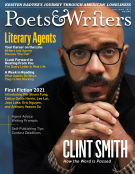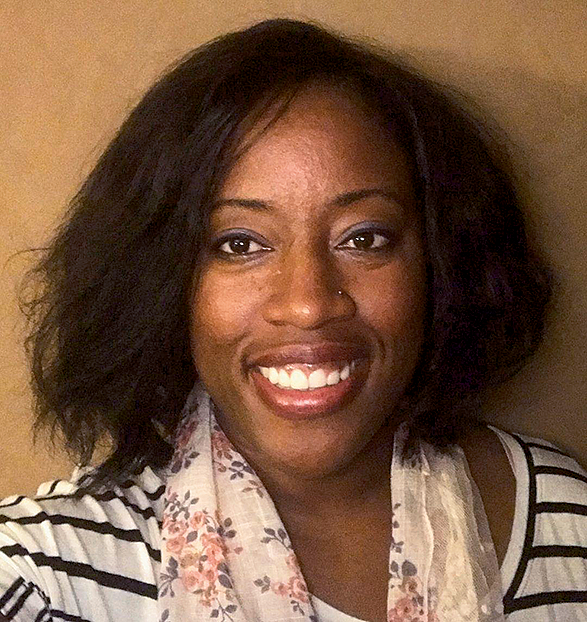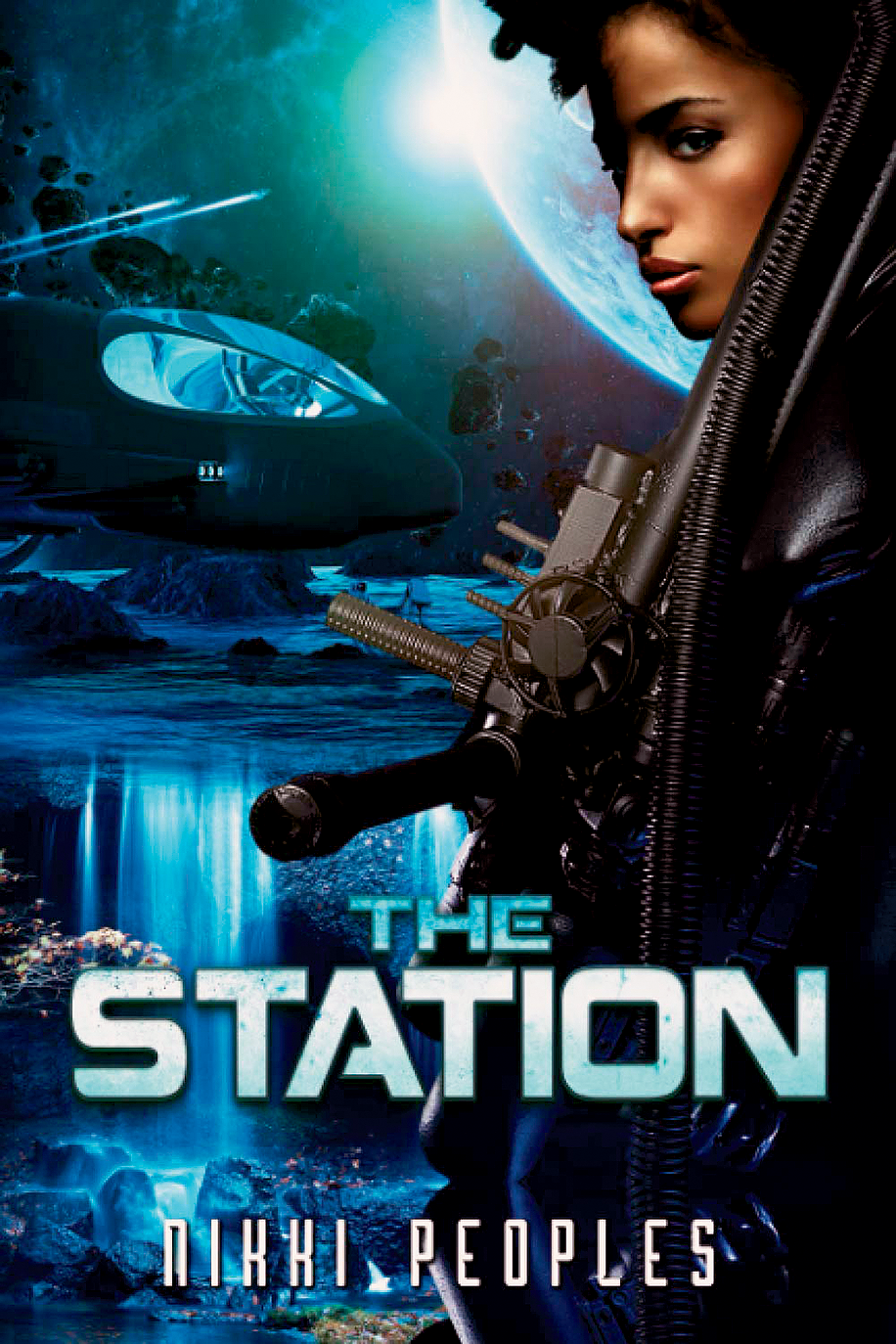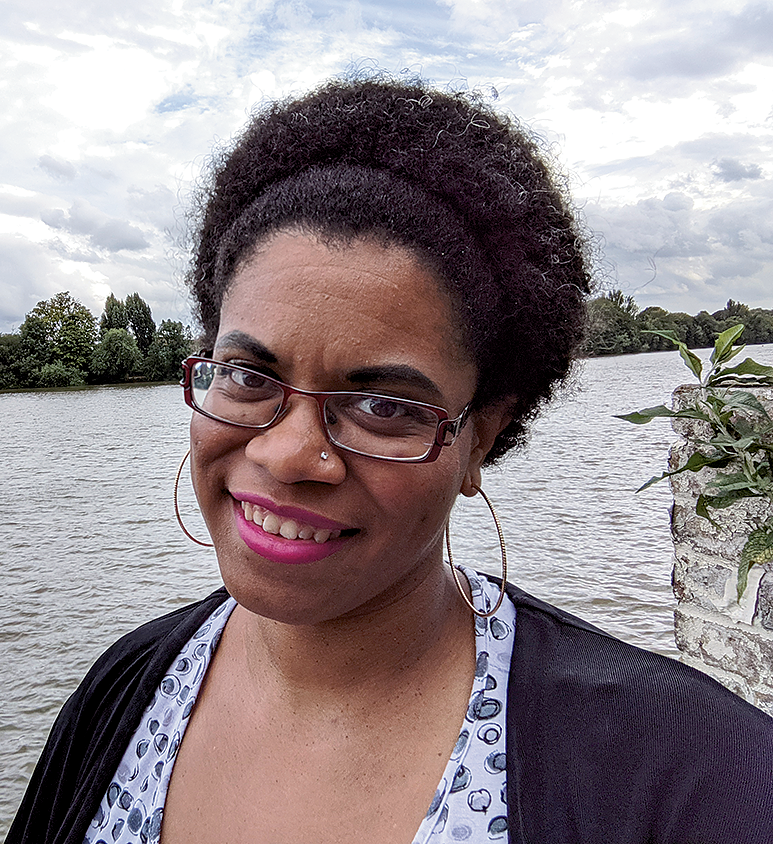Nikki Peoples, who is named after poet Nikki Giovanni, knew early on that she wanted to join a branch of the military. The daughter of a career military man, Peoples looked into officer training programs while in high school, but after a friend, one grade ahead of her, got into the United States Naval Academy, Peoples also decided to apply there and was accepted. She graduated from the academy in Annapolis with a bachelor of science degree in English in 1997, entered active duty for eight years, served for a period as reservist, then reentered active service for another eight years, retiring from the Navy after twenty years. Along the way she earned a master’s degree in Global Leadership in 2004 from the University of San Diego in California, a master’s degree in acupuncture in 2008 from the Academy for Five Element Acupuncture, and an MFA in 2014 from the low-residency program at Spalding University in Louisville, Kentucky. Five years later, in November 2019, she self-published The Station, about the murder of a senior ranking official on the USSS Midway, in the year 2398, and the officer who is charged with finding out who is responsible for the crime, Ensign Amelia Brown. Though she set the novel in the future, Peoples leaned on her experience in the Navy to inform the hierarchy of the crew and officers in The Station, along with details of weapons and the investigation.
I spoke with Peoples, who lives in Knoxville, Tennessee, where she runs an acupuncture clinic, about her experience as a self-published author. For perspective on how she and other self-published authors can reach a wider readership, I talked to D. Ann Williams, an independent editor for Tessera Editorial, and Wiley Saichek, founder of Saichek Publicity.
The Author’s Approach
While working as an acupuncturist, I wanted to find something to do outside of my day job; my then boyfriend suggested I try writing. I loved reading as a child and was obsessed with C. S. Lewis, but up until that point I hadn’t thought about writing myself. I chose to study writing at the low-residency MFA program at Spalding University because it gave me a flexible class schedule and the freedom to write what I wanted. I wrote the first draft of The Station quickly, but it took me about five years to complete the book. I received feedback from students in my writing program as well as other friends. One classmate wanted the book to focus more on racial issues, but I didn’t want to write about that—I wrote to captivate my readers with a strong protagonist and an interesting plot.
I had to put the book aside for some time—I was busy working, sustained injuries in an ATV accident and skiing mishap within three weeks of each other, and moved to Memphis—but when I turned forty-four, I knew I needed to complete it. Finishing projects is a priority for me. I don’t care how long it takes. I have to finish things, even if it takes ten years. I just can’t live with myself otherwise.
I worked on the book more and then queried agents and publishers but couldn’t get any traction. I did a lot of research, and everything I read seemed to show that the publishing world was changing and that agents were looking for diverse voices. But when I looked at their websites, I didn’t see diversity. One editor provided some feedback, saying she didn’t connect to the characters. It was frustrating, and I began to doubt that an agent or publisher would take me on. Agents seemed to focus on certain genres, and my book didn’t fit neatly into one genre.
I really wanted to get the book out, so I decided to self-publish. I worked with a line editor and hired 1106 Design, spending somewhere between $6,000 and $8,000 in total. In terms of the cover I already had an idea in mind, and 1106 found three or four stock images. We ended up with a cover showing two images: one of a spacecraft and one of the African American protagonist.
As a small-business owner I juggle a lot. I am on social media, and I have posted about the book a lot on Twitter, Facebook, and Instagram. I have tried to target my core readers: African Americans who like sci-fi and fantasy. Someone even suggested I use an alias to attract male readers, but I didn’t want to do that. I’m pleased because I have gotten mostly positive reactions. My parents loved it; they’re brutally honest and would have been critical if they didn’t think The Station was good. I have probably sold about a hundred copies. I will say that my marketing and promotional efforts have not been consistent. Publishing right before the pandemic didn’t help either. I approached some bookstores but was unable to schedule any events, and my plans to attend live conferences were put on pause.
My advice to anyone planning to self-publish:
• Decide whether you are writing a stand-alone novel or a series. If you are planning a series, outline the books in the series beforehand and consider writing the second one before publishing the first. People have asked when my second book is coming out. I wish that I had another book ready to keep the momentum going.
• Take time away from your manuscript. Edit yourself or ask an editor to work on your book and then take a month off. You lose objectivity if you don’t give yourself a break.
• Work with editors who are interested in your particular genre. You don’t want an editor telling you to rewrite your book because that person is looking for a completely different type of story.
• Understand that self-publishing is a good option provided you acknowledge that it is a business. Self-publishing is like starting any commercial venture. The book is your product. You will have to work incredibly hard to launch it successfully. And you’ll get out of it what you put into it.
An Editor’s Take
D. Ann Williams has ten years of experience as a writer, editor, and diversity consultant. She is an editor for Tessera Editorial, a group of BIPOC independent editors. Williams initially focused on nonfiction but now primarily edits historical fiction and romance.
The Station’s front cover is perfectly positioned for the science fiction genre, but there are some issues with the back cover that can be easily corrected. There is no author photo: Having one would let readers see that she is a person of color, which could entice some readers to choose this particular book. The author photo should also be posted on Amazon.
Strengthening the descriptive back-cover copy would also attract fans of this genre. The first paragraph, which identifies the protagonist and specifies the book’s setting, is clear—readers know that Ensign Amelia Brown will be investigating a murder. The second paragraph, however, mentions a “hunky Marine” with whom Amelia has a relationship. This made me think the book was more of a romance than a science fiction novel. The last paragraph, which ends with “…it is the stuff of nightmares” is confusing. This phrase is more appropriate for a horror, zombie, or alien invasion novel than science fiction. The copy should be rewritten to target sci-fi fans, not romance readers. While there are authors such as Kit Rocha who write sci-fi books that cross over into romance, these crossover books have very specific plot elements. The Station belongs to the sci-fi genre, and Peoples should make that evident in her back-cover and online copy.
Most authors who know they are writing a series often add a teaser chapter at the end of the first book or include a page inviting readers to sign up to hear news about when the new book will be available. Peoples can update The Station and upload this new content whenever she completes the sequel. If she sets up a series name and adds one or more books to that series, Amazon will link the books together for prospective buyers. In addition, Peoples can include a list of all her titles and publications on a page inside her books as well as on her Amazon author page and her website.
The pandemic has created a number of affordable promotional opportunities for Peoples and other authors. With so many events now held virtually, writers can interact in communities that they might not have been able to reach before. Event fees are considerably lower, and authors are saving on travel expenses. There are also “pitch parties” on Twitter. Some are genre-focused, so Peoples could look for communities focused on sci-fi. These are great ways to reach potential readers as well as publishing professionals, including editors and agents.
Peoples should try to reach potential readers by engaging on social media more. She can use different tags to highlight different aspects of the sci-fi plot. Since she is a busy entrepreneur with limited time, she should try to set aside time once a month and schedule posts for the book. Twitter is especially popular with self-published authors as well as publishing industry insiders.
Peoples can also consider hiring a service such as Booktrib.com to do a blog tour. These types of companies will market the book and send copies to bloggers on behalf of authors, saving them time, effort, and any concerns about legal details related to book giveaways or other promotions.
My advice for other authors who are self-publishing:
• Find an editor who reads and edits the genre that you write. Editors immersed in that category are familiar with certain genre tropes. Something that might be confusing to an inexperienced editor would make complete sense for an editor versed in sci-fi and fantasy. Readers can be very focused on technical details and also expect that books will be accurate—when they’re not, readers will call out mistakes online. Experienced genre editors won’t spend additional time verifying terms or definitions. Your primary decision is whether to handle writing, marketing, and the intricacies of self-publishing on your own. Be realistic about your available time. If you have family or other professional commitments, consider hiring professionals to assist you.
• What are your strengths? If you’re a designer or a marketer, then you may be comfortable designing your book cover or executing the marketing strategy on your own, thereby reducing some of the cost of self-publishing. On the other hand, if you don’t have a lot of time or interest in learning new skills, it makes sense to hire a full-service company that can handle cover design, interior design, editing, proofreading, and publicity. If you go this route, ask questions and check references from past clients. Look on Amazon at the books the company has produced to see whether they are attractive. If the authors are on social media, see whether they have posted about the service providers they have used.
• Consider using different editors, one for developmental editing and another for copyediting and proofreading. If I’m doing a developmental edit, I prefer not to copyedit that manuscript because I’m too close to the book and may miss something.
• When hiring a freelance editor, look at the books the person has edited. Ideally, you want an editor who has been editing consistently and has worked on recently published books. Also, many freelance editors will offer to do a sample edit—say, reviewing the first ten pages of a book—so you can see the editor’s approach to your work. If this option isn’t listed on the editor’s website, ask whether they will do a sample evaluation. Clarify up front how you and the editor will work together so there’s no confusion along the way. Ensure a written agreement specifying fee, payment details, and deadlines.
• At the end of the day, while you can do it yourself, writing and publishing a book isn’t something you should do alone. It is a collaborative process, and finding the best people to support you in that endeavor is key.
A Publicist’s Perspective
Wiley Saichek began working in publishing while a student, providing online publicity support for novelists Chelsea Quinn Yarbro and Suzy McKee Charnas, assisting at a local used bookstore, and volunteering for the Book Report Network’s chat rooms and message boards on AOL, and interning in Tor/Forge’s publicity and editorial departments. From 2002 to 2013, he spearheaded online publicity campaigns for the Book Report Network’s AuthorsOnTheWeb division while also managing freelance publicity projects. He left to establish Saichek Publicity in August 2013.
Even though The Station has been out for a while, Peoples still has many opportunities for coverage. In general, if your book isn’t a new release, don’t call attention to the pub date when pitching the media. If asked, of course, say when it was released, but these days many authors continue to promote their books well past the initial publication date.
Peoples should look for online review outlets that cover books in this genre. She can consider purchasing reviews, though I don’t believe that is the best option for self-published authors. Although booksellers and librarians read reviews in trade publications such as Kirkus Reviews or Publishers Weekly, paying for a review in one of these trades doesn’t guarantee your book will get a positive review. I always advise authors to go after free reviews first.
Pitch local and regional media. Approach a features editor at the local TV station or newspaper. These outlets often want to cover a local author. You can then use this review or clip to pursue coverage from regional media. In interviews, Peoples can discuss her background in the Navy, how she came to write the book, and her plans for future books.
She can also do outreach to websites, online magazines, bloggers, and podcasts in the sci-fi genre as well as speculative fiction. There’s romance in the book so she can also approach some romance book reviewers and podcasts. She should continue to tap into the African American market, which she notes is part of her core readership. Even more important, she should stress her career in the Navy and contact media that covers the military as well as groups and associations of military and retired military. Readers are often interested in career pivots, and Peoples shouldn’t hesitate to tell her story. Since the author is also interested in yoga and martial arts, she can also target media in these areas that might be interested in an author profile. Obviously, Peoples will have to prioritize her time to focus on the outlets that she feels are the best for reaching potential readers.
It’s all about tailoring expectations. If you don’t try, there’s no chance of getting coverage. If you get a rejection, you’re not a failure. You’re planting seeds for the next book. When the second book is scheduled, you can follow up with everyone you approached for the first book.
Authors shouldn’t simply send a press release. You need to offer review copies, an excerpt, or a prepared Q&A. You can also offer to write an essay geared to the particular outlet. While the essay isn’t specifically about the book, the title would be mentioned in the author bio. Some publications could include the book jacket or may review the book after running an original piece by the author.
While many self-published authors limit the number of copies they print, you should have at least five to ten physical copies of the book since some reviewers and bloggers still want to receive a physical copy. If you’re on a tight budget and understand that you may miss out on some opportunities, then you can try to send digital copies to the media. In lieu of galley proofs, some reviewers will accept a bound manuscript, which you can make at a local print shop or order online at FedEx or Office Depot.
In terms of online advertising, examine what promotions are most likely to generate book sales. Put together the right program—that could be advertising on Amazon, Google, or Facebook. Do your homework first. Start by spending a modest amount, and then analyze the sales results. Did your ad lead to sales? If it did, consider increasing your ad spend. If it didn’t, you may want to take a different approach.
Reach out to a local bookstore or library when in-person events are being held. Ask whether they hold events with local indie authors. If you are already involved in a local organization or festival, ask whether you can speak at an event or advertise in the event program. Consider joining an organization so that you can promote the book or subsequent ones in the future.
In terms of marketing, there are several ways Peoples can enhance her online visibility:
• Goodreads: Peoples should have an author profile on Goodreads, along with her bio and photo. A giveaway helps to get readers to post reviews of the book. She should limit the number of copies to make it more exclusive. Seeing how many folks register is a good indicator of interest.
• Amazon: She should add her bio to her author page.
• Message boards in the sci-fi community. Peoples should study how writers post about their books in these groups (though some communities don’t let authors self-promote and will ban those people).
• Author website: Peoples’s website, which is centered on her self-publishing imprint, Black Kat Books, is confusing. The focus isn’t on The Station. The website should look more like a typical author and/or book website with an excerpt from the book and live links to her social media. I recommend that Peoples have a website in her name.
My suggestions for other self-published authors:
• Set a budget but recognize that paying for professional editing and cover design is more important than hiring a publicist. Having a publicist won’t help you get coverage if your book isn’t editorially sound or looks unprofessional.
• Be ready to pivot. Consider moving the pub date of your book. Develop a launch plan, but have backup plans ready if conditions change. For example, instead of postponing an in-person event, consider holding it on Zoom instead. (Practice Zoom if you’re not familiar with it. Make sure you have good lighting.)
• Be patient with yourself, reviewers, and bookstores. It’s been an uncertain year and a half because of COVID-19, and no one can predict the future with certainty. Accept that it will take longer to get reviews and to find readers.
• Everyone is stressed, so be professional. If you’re rude—to a publicist, a reviewer, a blogger—you will alienate that person and lose an opportunity to get publicity for your book.
Debra Englander is a New York City–based freelance editor, writer, and book coach. She has written about business and books for numerous publications, including USA Today, Good Housekeeping, and Publishers Weekly.












